Teaching Learning Infrastructure
NCU has 60 Classrooms and 19 Tutorial Rooms. These are more than just learning spaces—they are environments where ideas grow, creativity flourishes, and students are prepared for future challenges. By offering technology-enriched, comfortable, and collaborative classroom spaces, NCU remains committed to delivering a premier education that empowers students for success in an ever-evolving world.
NCU’s classrooms are equipped with advanced audiovisual (AV) technology, Laser projectors, biometric attendance device, and interactive digital podiums.
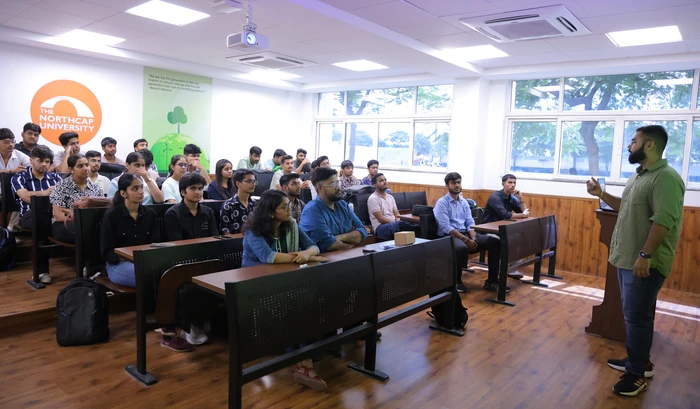
Each classroom at NCU is equipped with secure Wi-Fi, giving students and faculty access to digital resources, academic portals, and collaborative online tools. With our strong IT infrastructure, students can explore digital content and enhance their learning through various online platforms.
NCU offers 32 well-equipped computer laboratories that support various academic and research activities. The Department of Computer Science and Engineering provides specialized labs for subjects such as Network Programming, Database Management Systems, Software Engineering, Computer Graphics, Java Programming, Information Security and Cryptography, Operating Systems, Object-Oriented Programming, Internet and Web Programming, Mobile Computing, Software Testing, C/C++ Programming, Modeling & Simulation, Advanced Algorithms, .NET Programming, and Object-Oriented Software Engineering. These laboratories are designed to offer hands-on experience with contemporary computing tools and technologies, fostering an effective learning environment.
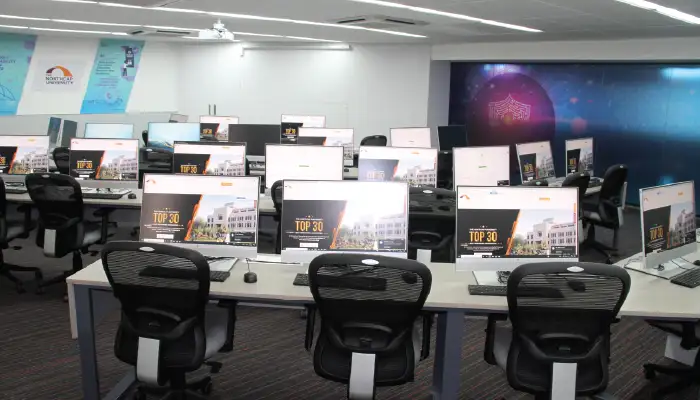
NCU also has dedicated labs for AI, Machine Learning, Cyber Security, and Data Science to support cutting-edge education and research in these fields. These labs are equipped with advanced computational resources, including high-performance computing systems and specialized software environments, which enable students and researchers to work on complex algorithms, data processing, and AI model training.
Academic facilities for students with disabilities are designed to create an inclusive and accessible learning environment that accommodates the diverse needs of students. These facilities typically offer a variety of services and modifications to support students in achieving academic success. Below are some common features of academic facilities for students with disabilities:
1. Assistive Technology
Screen Readers: Screen reader software (Narrator), a form of assistive technology that renders text and image content as speech or braille output is available.
Speech-to-Text Software: Programs that transcribe spoken words into written text, helping students with physical disabilities or learning disorders.
2. Specialized Learning Resources
Text-to-Speech Programs: Software that reads aloud textbooks and materials, benefiting students with reading disabilities.
Alternative Formats for Textbooks: Availability of materials in audio, Braille, or e-book formats to accommodate students with visual impairments.
Recorded Lectures: Lectures may be recorded and made available for later viewing or listening for students with hearing or learning disabilities.
The University has implemented the Rights of Persons with Disabilities Act 2016. The University takes all reasonable steps, within available resources, to attempt participation by specially abled students and staff in all aspects of University life on equal terms with other students and staff of the University, thereby complying fully with the relevant legislation from time to time.
NCU has state-of-the-art infrastructure with high-end labs and a centre of excellence, like High-Performance Computing Lab with 1 teraflop computing power and hosts the CISCO Network Academy, a joint venture between NCU and CISCO. NavIC Lab set up by ISRO Indian Space Research Organisation and many more.

The NorthCap University (NCU) offers several coworking and meeting spaces with high-speed Internet access, catering to students, faculty, and staff for collaborative and individual work. These spaces are designed to encourage interactive learning and productive meetings. With modern seating arrangements, ample power outlets, and access to both wired and wireless Internet, these areas ensure reliable connectivity for academic research, group projects, and online collaborations.
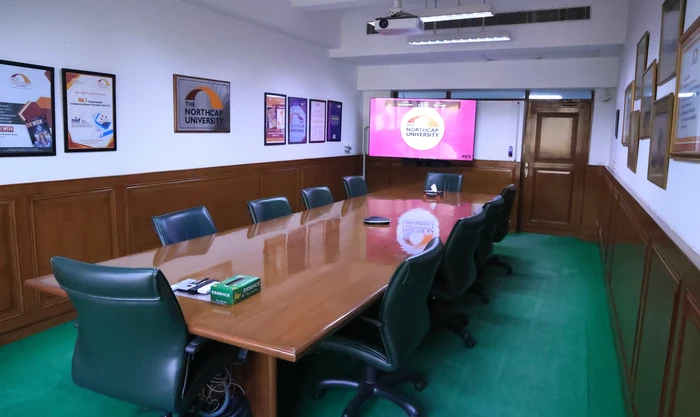
The IT infrastructure, supported by a secure VPN, ensures that students and faculty have access to digital libraries, academic journals, and other learning platforms from these coworking spaces.
The NorthCap University (NCU) is dedicated to providing advanced, technology-driven learning environments. The university has state-of-the-art smart classrooms equipped with digital technologies to enhance the learning experience. These classrooms feature smart audiovisual equipment, including ceiling array microphones, smart ceiling speakers, pan-tilt-zoom cameras for speaker tracking, interactive digital podiums, and high-resolution displays for both students and instructors. This setup facilitates interactive teaching and creates a simulated classroom environment, enabling students to attend virtual lectures from anywhere in the world.
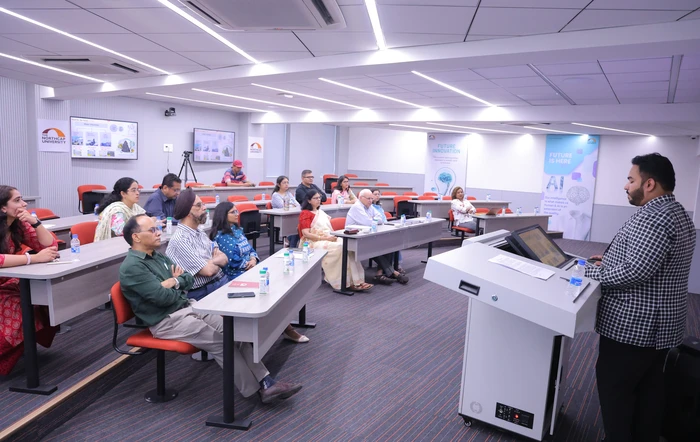
The NorthCap University (NCU) provides convenient on-campus printing services to support students, faculty, and staff with their academic and administrative needs. Printing facilities are available within the library and designated resource centers, offering services such as document printing, scanning, and photocopying. These services are especially useful for students preparing assignments, projects, and presentations, as well as faculty members handling course materials and research documents. The printing areas are typically equipped with high-quality, networked printers that provide quick and efficient access to printed materials.
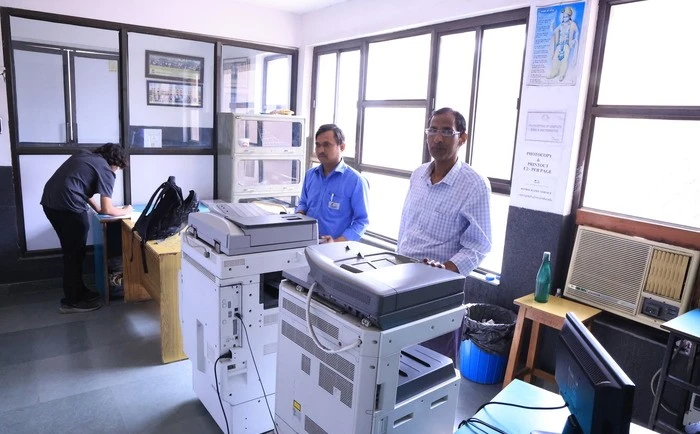
University has more than 100 printers provided to the various schools and offices to cater the printing needs of the users.
The NorthCap University (NCU) utilizes an advanced Biometric Attendance System to streamline and enhance attendance management for students, faculty, and staff. This system not only ensures accurate and efficient attendance tracking but also reinforces accountability and punctuality within the university community.
Key Features of NCU’s Biometric Attendance System
Seamless and Efficient Tracking
The biometric system records attendance in real-time, allowing students and faculty to check in within seconds using fingerprint or facial recognition. This automated process reduces paperwork and manual record-keeping, ensuring accuracy and efficiency.
Enhanced Security and Accuracy
The biometric system prevents unauthorized attendance logging and provides secure, tamper-proof data storage. This high level of accuracy ensures that only the person present can register their attendance, eliminating the risks associated with proxy attendance.
Real-Time Data Access
Both students and faculty can monitor their attendance status in real-time through the university’s online portal. Faculty members can access detailed reports to track attendance patterns, enabling them to address attendance-related issues proactively.
Attendance Compliance for Students
NCU emphasizes the importance of consistent attendance for academic success. The biometric system supports compliance with attendance policies by enabling accurate tracking of each student’s participation in classes. Students are required to maintain a minimum of 70% attendance, and the biometric system helps them keep track of their attendance percentage.
Integration with University Systems
The biometric attendance system is integrated with NCU’s ERP platform, allowing easy access to attendance data for faculty and administrative staff. This integration enables seamless reporting and ensures that attendance records are readily available for academic and administrative purposes.
At The NorthCap University (NCU), we are committed to providing comprehensive support services to ensure a seamless academic and campus experience for our students and faculty. Our Helpdesk is designed to address technical, administrative, and academic queries, making it a one-stop solution for assistance.
Helpdesk Services for Students and Faculty (https://ncuhelpdesk.ncuindia.edu)
1. Technical Support
- IT Assistance: Get help with campus Wi-Fi, VPN access, and troubleshooting software and hardware issues.
- Learning Management System (Canvas): Assistance with accessing course materials, submitting assignments, and navigating Canvas LMS features.
- Software Access: Guidance on downloading and using licensed software, including MATLAB, Turnitin, and more.
2. Academic Support
- Examination Queries: Assistance with online test platforms like Mercer Mettl, test schedules, and exam guidelines.
- Attendance Management: Support for biometric attendance registration, attendance tracking, and resolving discrepancies.
- Library Resources: Help with accessing e-resources, online journals, and managing VPN connections for off-campus access.
3. Administrative Assistance
- Timetable and Room Allocation: Support with class schedules, changes in timetables, and room allocations.
- Placement Support: Assistance with the Superset Placement Management System for internship and job applications, interview scheduling, and profile management.
- ID Card and Visitor Management: Support for ID card issuance and visitor management using the Vizitor app for faculty and students’ guests.
4. General Assistance
- Account Queries: Help with setting up and accessing email and Microsoft Office 365 accounts, resetting passwords, and managing account settings.
- Complaint Resolution: Students and faculty can lodge complaints or report issues directly through the Helpdesk. We ensure timely responses and resolutions.
- Campus Announcements: Stay informed about university-wide announcements, events, and important deadlines.
The NorthCap University (NCU) utilizes the Canvas Learning Management System (LMS) to support and enhance its academic and administrative processes. Canvas serves as the digital foundation for delivering course content, managing assignments, and facilitating communication between students and faculty.
1. Course Content Delivery
- Syllabus and Learning Materials: Faculty upload course syllabi, reading lists, lecture slides, and other essential materials directly to Canvas. Students can access these resources anytime, making it easy to stay updated with course expectations and study materials.
- Multimedia Integration: Canvas supports various media types, allowing faculty to share videos, audio clips, and interactive content. This multimedia approach enriches the learning experience, catering to different learning styles.
2. Assignments and Submissions
- Assignments: Faculty can create assignments with clear instructions, deadlines, and grading rubrics. Canvas organizes these tasks with due dates visible on students’ dashboards, ensuring students are aware of upcoming deadlines.
- Digital Submissions and Feedback: Students can submit assignments directly on Canvas, which faculty can review and provide feedback on. This digital submission feature streamlines the process, eliminating the need for physical paperwork and allowing for faster, more personalized feedback.
3. Quizzes and Assessments
- Quizzes and Exams: Canvas allows faculty to design quizzes and exams, including multiple-choice, true/false, essay questions, and more. These assessments can be scheduled, and the results can be tracked to gauge student understanding.
- Automatic Grading: Certain question types, like multiple- choice, can be auto- graded by Canvas, saving time for faculty. Students receive instant feedback, helping them understand their performance and areas of improvement immediately.
4. Gradebook and Tracking Progress
- Real-Time Gradebook: Canvas provides a centralized gradebook that updates in real-time as assignments and tests are graded. Students can monitor their progress throughout the semester and view detailed feedback.
- Progress Tracking: Both students and faculty can track progress on specific assignments and overall course goals. This transparency fosters accountability and allows for proactive measures to support struggling students.
5. Communication and Collaboration Tools
- Announcements: Faculty can post announcements for course updates, reminders, and other important information, ensuring all students receive timely notifications.
- Discussions and Collaboration: Canvas includes discussion boards where students can participate in group discussions, facilitating peer-to-peer learning and collaborative activities. Faculty can also join these discussions, guiding students and providing additional insights.
6. Calendar and Notifications
- Organized Calendar View: All assignment due dates, quiz schedules, and other deadlines appear on a centralized calendar. This feature helps students organize their study schedules and manage their time effectively.
7. Integration with Other Educational Tools
- External Tool Integration: Canvas can integrate with other educational tools and resources, including plagiarism detection software and various apps supporting learning and productivity. At NCU, Turnitin is integrated for plagiarism checks to ensure academic integrity in submissions.
8. Analytics and Reporting
- Usage Analytics: Canvas provides analytics that allow faculty to track student engagement, such as time spent on content, participation in discussions, and assignment completion rates. This data helps faculty identify students who may need extra support.
- Reports: Faculty can generate reports to understand class trends and overall performance, helping in adjusting teaching strategies and providing targeted support to students.
The NorthCap University (NCU) employs a Timetable Management System using ERP and ASC Timetable Software to efficiently plan and manage academic schedules. This system aids in organizing and allocating resources, classrooms, faculty schedules, and course timings, ensuring optimal use of university facilities and staff availability.
Key Features:
Automated Scheduling: ASC Timetable software helps automate the scheduling process, minimizing conflicts and balancing workloads across faculty members.
Resource Allocation: The ERP system integrates with the timetable to allocate classrooms, labs, and other resources based on course requirements.
Real-Time Access: Both students and faculty can access their schedules in real time through the university’s ERP portal, enabling quick updates and adaptability.
Conflict Resolution: The system is designed to resolve scheduling conflicts, providing alternative timings or resources as needed to maintain efficiency.
This integration supports smooth academic operations at NCU by providing an organized, centralized timetable that adjusts flexibly to the university’s academic needs.
The NorthCap University (NCU) leverages Superset as its dedicated Placement Management System, streamlining the campus recruitment process for students, faculty, and recruiters. Superset empowers the university to provide a seamless placement experience, from initial registration to final job offers, making it an integral part of NCU’s commitment to enhancing student employability.
Key Features and Benefits of NCU’s Placement Management System
1. End-to-End Placement Process Management
Superset enables the entire placement journey to be managed on a single platform, including student registrations, resume building, job applications, and interview scheduling. This integrated approach ensures efficiency, transparency, and ease for both students and recruiters.
2. Customized Student Profiles
Students can create professional profiles highlighting their skills, academic achievements, and project work. This feature helps recruiters quickly assess candidates based on customized criteria, improving the matching of students with suitable roles.
3. Real-Time Notifications and Updates
The system provides real-time notifications for job openings, application deadlines, and interview schedules, ensuring that students never miss an important opportunity. Notifications are sent directly to students’ devices, keeping them informed and engaged throughout the placement season.
4. Data-Driven Insights for Faculty and Placement Officers
Superset offers analytical tools that allow NCU’s placement officers and faculty members to track placement progress, monitor application statistics, and identify areas for skill development. This data-driven approach helps the university refine its career services and align with industry needs.
5. Seamless Recruiter Experience
For corporate recruiters, Superset simplifies the campus hiring process. Recruiters can post job openings, shortlist candidates, and manage interview schedules all in one place. The platform also offers a range of filters to help recruiters find candidates who best match their requirements.
6. Secure and Transparent
The Superset platform is designed to protect user data and maintain transparency throughout the placement process. Students and recruiters can trust that their information is handled securely, adhering to data privacy standards.
NCU’s Placement Management System powered by Superset reflects the university’s dedication to providing students with the resources and support they need to launch successful careers. With a user-friendly interface and comprehensive features, the platform ensures that every step of the placement process is streamlined, enabling NCU students to connect with top employers seamlessly.
